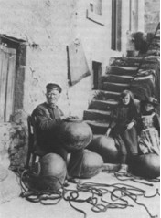|
Fishing Superstitions
Superstitions abound in the traditions of the fishing communities, names, appearances, days and seasons, all had their influence on luck. Some animals and people were so unlucky they must never be named. The salmon could be alluded to as "the red fish", the pig as "curly tail" and the rat as "lang tail"; the Kirk Minister was "the man wi' the black coat", "white-throat", "predikanter" and so on. Other inutterable words include certain surnames, among them Ross, Coull and Whyte. That indispensable commodity "salt" must never be mentioned at sea. An Eyemouth boat ran short of salt when fishing in 1905 and hailed a Yarmouth drifter: "We need something we dinna want tae speak aboot". The English Skipper bawled back: "Is it salt ye want?" The crew escaped the consequences of the dread word by keeping out of earshot below deck during the transaction, and the salt was handed over safely.
The antidote to bad luck words was to "touch cold iron". At St Monans in the 1840's a visiting Minister based his sermon on the parable of the Prodigal Son. "... and he went into the fields and fed the swine", the Minister intoned. "Youch cold iron" the fishermen muttered to one another and down went the heads as the men bent to touch hob-nails and iron tipped boot-heels. After a puzzled pause, the Minister repeated "... to feed the swine", - with the same reactions. Doggedly the Minister carried on with the parable: "...the husks that the swine did eat!" It was too much - the congregation bolted helter-skelter from the kirk, yelling "Touch cold iron!"
Encounters deemed to be unlucky would turn a fisherman from putting to sea. A red-haired person, someone flat-footed, "ill-fitted* or generally odd looking, even a queer looking dog would be enough. If anyone asked where he was going, that was enough to turn a fisherman back. In the environs of Buckie, a strange beastie - a "Cockieoo" - was said to lurk ready to snatch off a man's "Bonnet". A hare or rabbit or salmon found on board the boat would have prevented a fisherman from sailing that day. Mischievous boys (probably sat on the upper decks of buses - ed) have been known to stuff a rabbit skin with rubbish and place it on the stern to stop a man from putting to sea. At Eyemouth, much consternation was sometimes caused by sheep and pigs washed down into the harbour by the river in spate.
At Nairn it was unlucky to shoot nets on the Port side, to taste food before any fish had been caught, and not to take blood from the first fish caught. In Morayshire it was unlucky to go to sea at the beginning of the season before blood had been shed - often a free fight was started to achieve the desired result. At Burghead a fisherman would never go to sea after the New Year until he had drawn blood. A Portlessie fisherman would go as far as to punch the nose of anyone rash enough to wish him "Good Luck" (a sure sign he'd not catch fish!), thus drawing blood so as to turn the ill-luck. Some boats were thought to be lucky or unlucky from the start. One way of getting good luck was always to row the boat sun-ways when first leaving the shore. It was tempting providence to turn a bout in harbour against the sun. "Pit the boaties heid wast aboot". The Caithness fishermen shared the almost universal belief among sailors that winds can be whistled up. A Caithness wife would never dare cool the oatcakes by blowing on them, lest a storm arise and endanger her mans boat. No fisherman's wife would venture to comb her hair if her "guid man" was at sea - and she new there was good luck awaiting him if she dreamed of a white sea. Fisherfolk marriages had their particular customs. At Crovie, weddings were generally on Saturday, and the Bridegroom didn't go to sea for a week (how convenient - ed). The Bride's Kist of clothes and linen must ever be taken home on a Friday. At Gordonstown, the Bridal Bed had to be made by a woman suckling a bairn, or the Bride would have no family.
Days of the week had their special significance. Nobody would cut their nails on a Tuesday, for fear of witches. Wednesday was the most unlucky day for girls to enter domestic service. Changes of weather were always expected on a Friday. Work began on Saturday would require seven more Saturdays before completion; while a job started on Monday was always likely to be finished quickly. Sunday was a lucky day, yet there was firm conviction among many that it was unlucky to fish on a Sunday. Some maintain that Dunbar and Stonehaven ceased to be important herring ports because the fishermen once used to go to sea on a Sunday. Yet in Prestopans it was reckoned lucky to start fishing on a Sabbath - but not until a blessing had been pronounced , that is, after the Morning Service. The first Monday and the first Friday of every quarter were said to be unlucky.
Home Page
|
|
